FUSION OF CIVILIZATIONS- SCHOOL CURRICULUM DESIGN FOR GLOBAL PEACE
Go Back

CACSI, CYSCC of China Association for Science and Technology (CAST), CSHST, ECOSF and IAP-SEP Co-Organized the 2017 International Forum on Science Education in Beijing, China, 3-4 July 2017
China Association of Children’s Science Instructors (CACSI), Children and Youth Science Center of China Association of Science and Technology- CAST (CYSCC), Chinese Society for the History of Science and Technology (CSHST), ECO Science Foundation (ECOSF) and Inter Academy Partnership – Science Education Programme (IAP-SEP) co-organized the 2017 International Forum on Science Education in Beijing, China on July 3-4, 2017. The forum focused on the theme of Fusion of Civilizations curriculum design for Peace and Harmony along the “One Belt One Road (OBOR) initiative of China. Thus the Forum deliberated on the history of science education along the OBOR.
The Forum was well attended by more than 30 historians of science and curriculum development experts and managers from 11 different countries. The Forum included keynote speeches, presentations, field trip to ancient astronomical observatory and round table discussions on various themes of Curriculum Development and History of Science and Technology along the ancient Silk Route (Programme is attached). ECOSF sponsored the participation of Curriculum Experts and Historians of Science and Technology from the ECO Member States viz.,Iran, Pakistan, Turkey and Uzbekistan (List of Participants is Annexed). On behalf of ECO Science Foundation, Prof. Dr. Manzoor H. Soomro President ECOSF along with Engr. Khalil Raza Scientific Officer participated in the Forum.
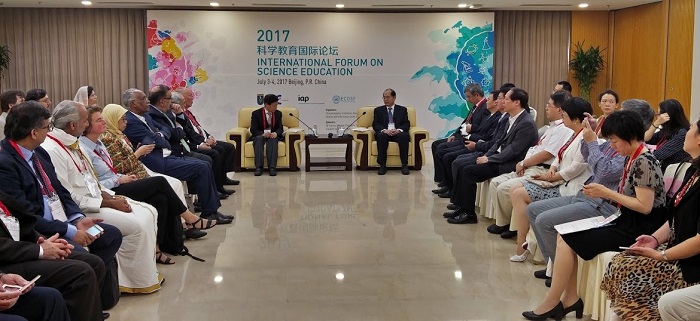
Participants during the Opening Session of the Forum
The Forum was opened by Prof. Liu Depei, the President of Inter Academy Partnership (IAP) and Prof. Wang Qinglin, Deputy Director General of Department of International Affairs, China Association for Science and Technology. Prof. Liu Depei, in his welcome address appreciated the efforts undertaken by all the partners in co-organizing this Forum on the important theme of Science Education along the Belt and Road. Prof. Depei underlined this Forum will help develop meaningful relations and cooperation amongst various countries under Chinese President Xi Jiinping’s OBOR initiative. With better understanding and strong cooperation amongst these nations, the Forum has the potential to develop mutual learning and understanding between civilizations and promote global peace and development in the entire region, he added. He also emphasized to promote Inquiry Based Science Education (IBSE) in the region to prepare younger generations to be well equipped to respond to the global challenges in the Future.
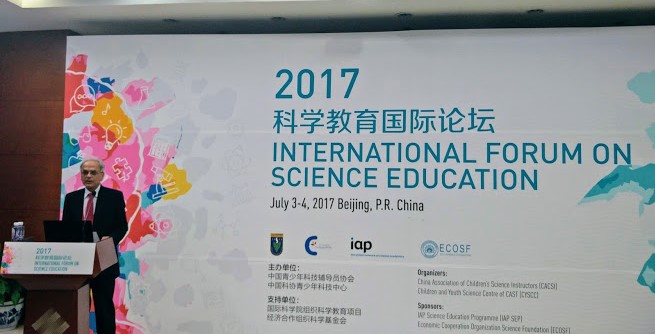
Prof. Dr. Manzoor H Soomro President ECOSF speaking in the Opening Session of the Forum
Prof. Dr. Manzoor H Soomro President ECOSF spoke in the opening session introducing ECOSF and its programmes and collaborations. He also contributed to discussions on various aspects of curriculum development based on Fusion of Civilization. He also moderated one of the Round-Table Discussions on Fusion of Civilization Curriculum Development. In his address, Prof. Soomro thanked all organizing partners for their sincere contribution towards the successful co-organization of this Forum. Prof. Soomro introduced to the participants the role of ECOSF and its flagship programs, such as IBSE and establishment of S&T Fund to promote S&T development in the ECO region. With strong collaboration of Chinese partners under belt and road initiative, the Forum is potentially a great opportunity to develop a curriculum that promotes peace and contribute to the socio-economic development of countries along the Belt and Road, he said.
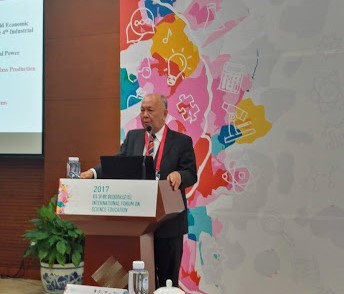 Dato Lee Yee Cheong, Chair IAP SEP Global Council and the Honorary Chairman, International Science Technology and Innovation Center for South-South Cooperation (ISTIC) made his keynote speech on “Children as Agents for Peace and Harmony through Inquiry based Science Education”. Dato Lee underlined that OBOR is the vision initiative of china that will transform economic and social and sustainable development in the sixty odd countries along the Belt and Road. He stressed for adopting the IBSE pedagogy for Children for teaching common humanity amongst cultivations and cultures to promote peace and harmony.
Dato Lee Yee Cheong, Chair IAP SEP Global Council and the Honorary Chairman, International Science Technology and Innovation Center for South-South Cooperation (ISTIC) made his keynote speech on “Children as Agents for Peace and Harmony through Inquiry based Science Education”. Dato Lee underlined that OBOR is the vision initiative of china that will transform economic and social and sustainable development in the sixty odd countries along the Belt and Road. He stressed for adopting the IBSE pedagogy for Children for teaching common humanity amongst cultivations and cultures to promote peace and harmony.
Mr. Li Xiaoliang, Executive Vice President of China Association of Children’s Science Instructors (CASCI) made his keynote speech on “Science Education and Cooperation along the “Belt and Road”. Mr. Xiaoling asserted that “The Belt and Road” initiative is aimed at carrying forward the Silk Road Spirit of “Peace and Cooperation, Openness and Inclusiveness, Mutual Learning and Mutual Benefit”, upholding the principle of joint discussion and joining hands with the rest of the world for common development. Promoting children’s science and technology education, improving future laborers’ scientific quality and cultivating scientific and technological are strategically important to contribute to economic and social development of countries along “The Belt and Road”, he said.
Prof. Sun Xiaochun, Acting Dean of School of Humanities, University of Chinese Academy of Sciences made his keynote presentation on the Connecting Force among Civilizations along the Silk Road. Prof. Sun presented a few examples of astronomical exchange between China and Islamic Countries in medieval times to illustrate the transmission of scientific knowledge between china and countries along the Silk Road.
Besides, Prof. Dr. Moneef Zou’bi, Director General, Islamic World Academy of Sciences (IAS) and Prof. Cecile de Hosson, Associate Member of “La main à la pâte” Foundation also spoke and made their presentations during the Forum
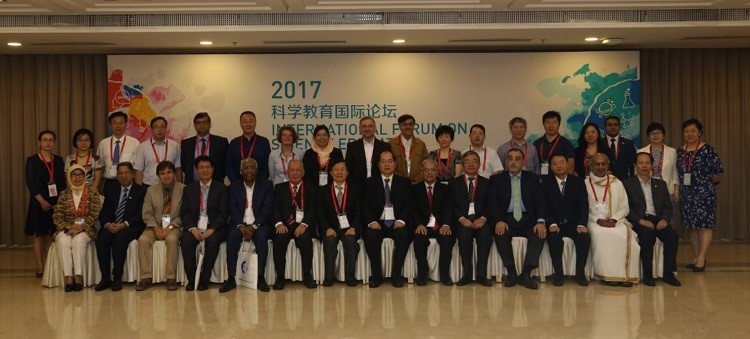
Participants During the International Forum on Science Education
This Forum was a follow up of initial discussion on the theme in Khartoum Sudan (Feb 2017) and marked the beginning of the process, whereby the experts deliberated and brainstormed on the way forward and pathways to achieve the desired goals of developing the Curriculum based on the grand concept of Fusion of Civilizations. A joint Working Group was constituted comprising Historians and Curriculum Experts from different countries, which is aimed at bringing together these experts to discuss how to develop and materialize the IBSE curriculum based on Fusion of Civilization. Based on the recommendations of the Working Group, the curriculum will be further discussed, developed, and presented in the subsequent Forums that will be held in Tajikistan and Pakistan later during this year.
During the round table discussions, Water and Astronomy were identified as two core areas to begin with accumulating ideas and scientific discoveries during the ancient civilizations, as they take important place in ancient culture and civilization but also inline with the “Belt and Road” initiative of P.R. China. The knowledge of Astronomy was fundamental to make key decisions on transportation, directions and as well in determination of various religious rituals. Whereas, relevance of water has been intuitively important since the beginning of human civilizations, for their survival from the point of view of food, agriculture, trade and clothing etc.
These experts in the Working Group put forwarded their ideas as to how different civilizations developed the knowledge and applications of water, astronomy and Transportation, and how this knowledge has contributed to the development of modern day applications of science and technology. “The Discoveries in Islamic Countries” by the la main a la pate (LAMAP) Foundation of France is an excellent example, which can be replicated for ancient Chinese and Indian Civilizations.
Participants underscored that countries along the Belt and Road have rich, diverse and interactive scientific achievements. Currently, world economic growth is slowing down, and people are faced with many unconventional threats such as resources scarcity, transnational communicable diseases and terrorism. Under those circumstances, youth science education has become increasingly important. Cooperation and exchanges on science education will not only provide human capital, but also promote regional and global peace and prosperity.
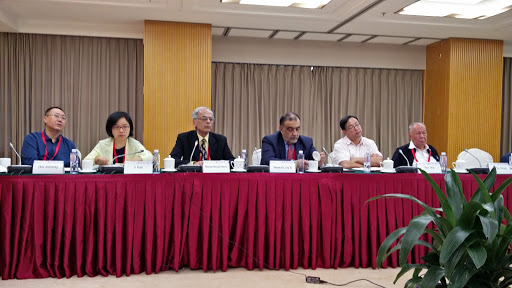
Round-Table Discussion on Development of the Fusion of Civilization Curriculum chaired by President ECOSF
Under the theme of “The History and Science Education along the Belt and Road”, experts elaborated the importance and possible ways of popularizing IBSE among children and youth among the Belt and Road countries; roundtable discussions were held to pin down concrete steps to carry out the program; the experts made following declarations:
- Participants agreed to develop an IBSE curriculum that reflects the ancient wisdom of S&T of the civilizations along the Belt and Road and aims at promoting the young generation’s understanding and respect among different civilizations. A joint working group was formed and members include both science historians and curriculum designers, from both China and other countries along the Belt and Road. Six concrete subjects were specified with water and astronomy as the priority area.
- Participants agreed to strengthen research of science education among countries along the Belt and Road and thus provide intellectual support to cultural exchanges and science education cooperation under the Belt and Road initiative.
- Participating experts were of the view that communication and cooperation in science education under the Belt and Road initiative is meaningful and promising. Careful planning and concerted efforts are especially needed to make progress towards tangible outcomes and then implement them solidly. All participants agreed with the vision and ideas proposed by the organizers of this forum and will work in accordance with it. It was considered important for CAST China and its associated institutions to play the leading role and take advantage of experts and science education resources of international and regional organizations.
- Participating experts appealed to relevant departments and organizations in China to establish official or semi-official coordination mechanism to facilitate science education cooperation as soon as possible. The mechanism will help to aggregate science education resources and establish stable platform for communication and cooperation in science education under the Belt and Road initiative.
The Forum concluded with success and Chinese organizers (CACSI and CYSC) appreciated and acknowledged the support and cooperation extended by ECOSF and IAP-SEP. Prof. Dato Lee Yee Cheong and Prof. Manzoor H. Soomro were presented with souvenirs.
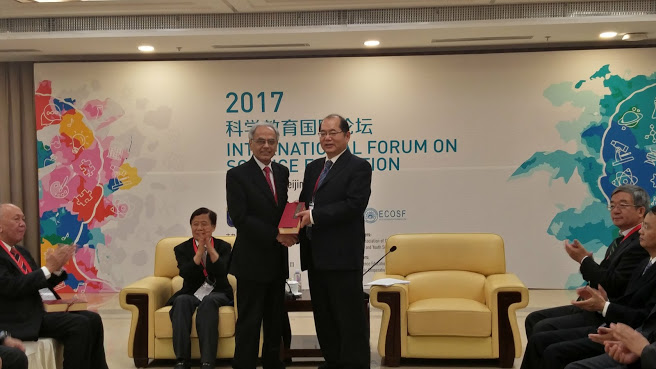
President ECOSF being presented with Souvenir by Prof. Wang Qinglin, CAST